Stuart Aken's Blog, page 249
February 28, 2013
What Do You Most Fear as a Writer?
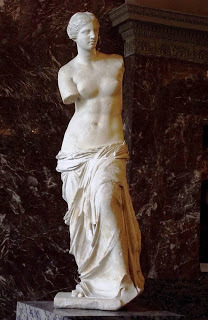 Fear is a strong but often necessary emotion. It can be both motivational and paralyzing. Writers, especially beginners, often allow fear to prevent them either finishing or publishing a piece of work. I have many social connections with writers on the internet and I’ve noticed a tendency amongst some, often the most sensitive, to find excuses not to finish a piece of work. They’re forever editing their work as they go along. They fool themselves into the idea that they’re seeking perfection. In reality, they’re putting off the moment when they have to admit to themselves, and to the world, that this is as good as they can make it. No piece of work is ever perfect, either in the eyes of the reader or, more especially, in the opinion of the producer. Unless, of course, the writer happens to be one of those individuals who is so convinced of his own ability that he’s unable to see past his many faults. Paradoxically, it’s often those with the most confidence in their own ability who produce the worst work.
Fear is a strong but often necessary emotion. It can be both motivational and paralyzing. Writers, especially beginners, often allow fear to prevent them either finishing or publishing a piece of work. I have many social connections with writers on the internet and I’ve noticed a tendency amongst some, often the most sensitive, to find excuses not to finish a piece of work. They’re forever editing their work as they go along. They fool themselves into the idea that they’re seeking perfection. In reality, they’re putting off the moment when they have to admit to themselves, and to the world, that this is as good as they can make it. No piece of work is ever perfect, either in the eyes of the reader or, more especially, in the opinion of the producer. Unless, of course, the writer happens to be one of those individuals who is so convinced of his own ability that he’s unable to see past his many faults. Paradoxically, it’s often those with the most confidence in their own ability who produce the worst work.We’re all fitted with our own internal critic, the editor that sits on our shoulder and pinches us each time we misspell, use an inappropriate word, produce an ugly sentence, dole out a thoughtless cliché. The trick is to knock the editor off, send this nit-picker to the back of the creative mind and make him wait there until he’s required. If I allowed my internal editor free reign, I would never have completed a single piece of work, let alone published anything or won competition prizes.
I know the arguments against relegating the editor to a back seat during creation. I’ve heard them all. ‘I can’t ignore even a typo; it stops me moving forward.’ ‘I have to have that first sentence perfect before I can move on to the next.’ ‘How can I say a piece is moving forward when I know there are errors there to be corrected?’ And so it goes on. Let me be frank, brutal, even. If you’re unable to get past these self-imposed barriers, you are in the wrong job. You are never going to be a creator. You should be working as a copy editor, a proof-reader, a lumberjack, jockey or any other occupation you care to name. But, honestly, if you can’t allow for your own mistakes during a first draft, you’ll never complete one. This isn’t a personal opinion but a logical conclusion. Think about it: NO piece of written work will ever be considered perfect by every reader or writer; ergo, whatever you do to make it perfect will make it imperfect for someone else.
So, what can you do?
First of all, face that fear and call it by the name it actually responds to. This isn’t a fear of never getting it right, this is a fear of success, a fear that you may actually produce something that a publisher will accept and place before that group of people we all want to admire us; readers. It’s a fear that one, maybe more, of those readers will spot something to make you feel foolish, inadequate, less than perfect. That’s the real fear you’re facing.
But, hang on: the publisher accepted it and put it out there for his readers. So he must think it worthy of a showing. The reader who finds fault is only one of the tens of thousands of people who’ve read and enjoyed the piece. It’s inevitable that one in thousands will have the necessary jealousy, pedantry, personal loathing of a particular sentence construction or any other individual trait you care to mention, to pick a hole in your work. The courage of the artist comes from facing that reality and deciding you don’t care about that one lunatic, obsessive, nit-picking pedant, or envious swine. And, if you think of such critics in those terms, it does make it easier to ignore them.
Having faced that possibility, the next step is take action. This involves actually sitting down and completing the first draft of a piece. But the only way you’ll be able to do this is to accept that that first draft, which no one else will ever see, will be full of errors. Think of it as the block of wood the sculptor uses to fashion a beautiful statue. The first chisel cuts, which may even be crude lopping with a chain saw, will not produce anything that even resembles the finished article. But, unless that sculptor takes his axe, his knife, his chisel or his chain saw to the block of wood, he’ll never have anything to show beyond his own vision of the finished article. You’re no different. Writing, of any sort, is a creative process. You begin with only three things: a blank sheet/screen, a means of making marks on that surface, and an idea. Creating is about having the courage to make those initial marks, knowing that some will be errors, minor and major, but aiming for an end which will have some approximation to the initial idea.
I know it’s hard. I know from early personal experience. I know it seems almost impossible for some of you. But the method that has the greatest potential to get your written work completed to a standard where you may feel confident enough to allow someone else to read it, is to write it first. Obvious. But I mean by this that you write the entire idea, complete the story, the article, the feature, even the novel, first. Then go back and allow that other half of your brain, the editor, the pedant, the policeman, to pick holes in it. Consider this not an assault on your genius but a practical help in forming the piece exactly as you envisaged it. If you think this can’t be done, consider: I’m in the process of writing an adult epic fantasy trilogy. The first two volumes are written and I’m editing volume 2 before I start to write the final volume. (Yes, I could have considered the entire trilogy as a single piece, but I see each book as a stand-alone piece). My point in mentioning this is that each of the first 2 volumes exceeds 220,000 words and each was written without ever going back, even a page, before I came to the end of that book. Yes, it meant a huge amount of editing, proof-reading, amendment and correction. But, and this is the point, I would never have finished even the first chapter if I hadn’t just ploughed on with the story.
So, face your fear, accept it for what it is, and beat it. Otherwise, you’re condemned to remaining a wannabee, a frustrated artist with nothing to show for your efforts and abilities. I urge you to try this at least once. Choose a short piece to begin with. Write the whole piece before you even look at what you’ve written. Leave it for a week, or more if you can bear it; do something else. When you revisit it, you’ll find all sorts of faults, but you’ll also be amazed at what you’ve written. That’s the time to free your editor and let him polish the work, let him find and correct the errors. You may end up with your own Venus de Milo or David. You might even complete something more sublime. Who knows? The answer, my friend, is ‘no one, until; you have the courage to try.’
I started by asking what you fear most as a writer and, for the sake of fairness, I must admit my own fear. I fear, in spite of the evidence to the contrary, that I’ll run out of things to say. And how do I face that fear, how do I work against the likelihood? Well, in my case it’s an easy fear to face and address: I take an interest in as many things as I can. That way, I’m unlikely to dry up. As one of those writers compelled to create, I’m lucky. Motivation is never a problem. Time and energy are my most precious and most easily exhausted factors. But more of that in a different post.
For now, I’ve confessed my own fear and hopefully addressed one of those most common to writers. But what’s your fear and how do you deal with it? You never know, by putting it out there in public you may do two very useful things: you may help some other poor tortured soul, and you may find a way of helping yourself get over what you most fear.
(In the spirit of illustration, it took me almost exactly an hour to create this piece. And a further quarter of an hour to edit and correct it. I know, because I keep a time sheet of my activities in order to ensure I don’t waste that most precious of assets: time.)
Related articles
 Seven Tips From Ernest Hemingway on How to Write Fiction
Seven Tips From Ernest Hemingway on How to Write Fiction
 Facing Writing Fears: Test Your Creativity
Facing Writing Fears: Test Your Creativity

Published on February 28, 2013 01:00
February 27, 2013
Clouds, by Michael Frayn, Reviewed.
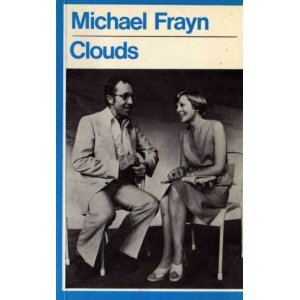 First performed at the Hampstead Theatre, London, in August 1976, this two act play is another of Frayn’s comedies. However, I’m at a loss to know for certain what it’s really about.
First performed at the Hampstead Theatre, London, in August 1976, this two act play is another of Frayn’s comedies. However, I’m at a loss to know for certain what it’s really about.Set in Cuba (though the stage is a blank arena with stepped surfaces, chairs and a back-projection screen to receive the images of the sky that give the play its name) the action revolves around a trio of writers who are there to report on the state of the island a short time after Castro’s takeover. As a teenager during the time of the Cuba Crisis, when we held our collective breath as Kruschev and Kennedy postured over the issue of nuclear missiles sited on the island, Cuba holds a resonance unlikely to echo through the blood of the modern reader.
There’s a love story in here, though it may be that simple lust is the driver, in spite of the protestations of the protagonists. There are cultural misunderstandings, cynicism on an epic scale, subtle, and not so subtle, political asides, and, of course, humour. The go-getting American, the lady novelist and the reporter from the UK are stereotypical yet manage to convey some individuality. The tired diplomat-cum-guide-cum-minder is just that, but hovers between his sense of duty and the lust he develops for the lady novelist. The driver is a rogue, philanderer and wide-boy with an obvious eye for the ladies and the only male in the cast who appears immune to the charms of the novelist.
So, an interesting cast with an intriguing span of relationships. We follow them on their odd tour of the island, a typical itinerary for a communist regime, ensuring these foreigners see all the technical and commercial developments but are excluded from intercourse with the actual people wherever possible. There is the standard misunderstanding, deliberate or otherwise, between the eventual would-be lovers. There is the expected friction between the American and British writers. There is the unconscious condescension shown by the writers for their guardian and driver. But, in the hands of this master, the sometimes spare dialogue is made to say so much more than the mere words.
I imagine the sparse setting would enhance the dialogue, which is what the play is all about, removing visual distractions so that all attention is given to the characters as they set about their tasks of misinformation, professional and personal rivalry, seduction and petty jealousy.
The text made me laugh where I was expected to find humour. It made me react emotionally to the various scenes of conflict, co-operation, misunderstanding and attempted sexual conquest. But I was left with an ending that seemed unfinished and flat. I didn’t expect an explosion, merely something that wound up at least something of the action that had preceded it, rather than the rather vague conclusion that the experience had changed nothing.
Would I go to see the play performed? I wouldn’t queue, but if it were easy to attend, I think I’d give it a try. Make of that what you will.
Related articlesFidel Castro attends Cuba parliament
 End of Castro era in Cuba near...
End of Castro era in Cuba near...

Published on February 27, 2013 02:29
February 24, 2013
Lakeland to Lindisfarne, by John Gillham, Reviewed.
 Walker, moutaineer, historian, or just interested in the great outdoors? This book has something for you. It was a Christmas present from one of my wife’s sisters, some years ago, and has been sitting on the shelf until now. I picked it up as a light alternative to the rather disturbing piece of fiction I finished last week. And I’m so glad I did.
Walker, moutaineer, historian, or just interested in the great outdoors? This book has something for you. It was a Christmas present from one of my wife’s sisters, some years ago, and has been sitting on the shelf until now. I picked it up as a light alternative to the rather disturbing piece of fiction I finished last week. And I’m so glad I did.This guide is intended as just that; an introduction to and a planning tool for a coast to coast walk from the west to east shores of northern England. John Gillham makes it clear from the start that you need to procure more detailed maps than the illustrative drawings he supplies alongside the text, if you are to complete this varied ramble through some of our finest landscapes.
There are mountains, vales, rivers and moors to cross on this varied route. And Gillham brings them all to life, adding small panels of local history where applicable. The reader learns some fascinating facts along the way, and is entertained with rural humour. He gives tips about various villages, pubs, bothies and ancient monuments. He also provides alternative routes, catering for the less experienced walker as well as the proper mountaineers.
For me, this was a trip back to a pleasant past. The walk starts in the Lake District, where my wife and I spent our honeymoon, and brought back many happy memories of those days. The middle section takes the reader through an area of England not much visited and one that I do not yet know. But the last part of the walk, as it approaches the north eastern coast, involves a walk through Hexham where, before we were married, we were mistaken for hotel inspectors at the hostelry we’d chosen for our meeting. Needless to say, the service and food were excellent on that occasion! The route passes Rothbury, where we dined together at another time in our early relationship. Unfortunately, on that occasion, I contracted food poisoning that resulted in the most horrendous drive back down to the Essex town where I then lived. It passes through Clennel Street, close by Clennel Hall, where we stayed very early in our relationship and confirmed that we would spend the rest of our lives together. So, another pleasant reminder. And, in fact, as a result of reading the book, we’re now intending to do some parts of the walk.
I’m well past the days when I can contemplate tackling such an arduous walk as a complete exercise, but, because John Gillham breaks it up into smaller parts, we’ll definitely be hiking several parts of it over the coming years. And I give my thanks to him for mapping out this route through some of the most spectacular and beautiful scenery in this small island of ours.
The photographs that illustrate the walk are all excellent; some merely informative, but many reflecting the beauty of the landscape and giving a clear idea of what the walker can expect to see along the way. I look forward to visiting these places with my wife and my camera in the near future.
The final part of the book is a diary, kept by John’s new wife, Nicola. This is a charming, personal account of her trip with him as he mapped out the routes he suggests. It gives a touching insight into the loving relationship between the couple and provides a more intimate view of both the pleasures and hardships that the walker may encounter along the way. I enjoyed this short piece every bit as much as the main narrative.So, whether you’re a seasoned walker, a sometime rambler, or one of those tourists who rarely moves more than a few paces from your car, there’s something in this book for you. I picked it up as a contrast to the gritty and disturbing fiction of urban poverty that I’d read previously. As an antidote, it was perfect, and I thoroughly recommend it.
Related articles
 Ladies Coast to Coast in aid of Hospice at Home Carlisle and North Lakeland
Ladies Coast to Coast in aid of Hospice at Home Carlisle and North Lakeland
 Ramblers creates heavenly hikes in England for adventurous jet-setters (Photos)
Ramblers creates heavenly hikes in England for adventurous jet-setters (Photos)

Published on February 24, 2013 06:34
February 21, 2013
The Witch’s Cradle, by Gillian White, Reviewed.
 Some novels are not created to be enjoyed but to inspire, educate, shock, grip or horrify. Gillian White manages to do all these things in The Witch’s Cradle. It took me longer than usual to read this book, simply because the tale is so dense with event and so drenched in emotion that I was unable to read more than a portion at any one sitting.
Some novels are not created to be enjoyed but to inspire, educate, shock, grip or horrify. Gillian White manages to do all these things in The Witch’s Cradle. It took me longer than usual to read this book, simply because the tale is so dense with event and so drenched in emotion that I was unable to read more than a portion at any one sitting.The inclusion of short quotes from that evil medieval book, The Malleus Maleficarum (another title on my ‘to read’ list) points the reader to the author’s views of events and the depiction of the central heroine. And, heroine she is. Misguided, naïve, ignorant, intelligent, forceful, needy, determined and courageous, Cheryl battles against forces both external and internal in her desperate fight to do what she feels is best for her children. Husband, Barry, emerges from youthful sulkiness and self-defeat to become a mature and pragmatic adult.
The villains, and they are real, appalling and credible people, are the sort of people you will want to hit on sight. I won’t give names here, as the clever way in which the tale is written allows for any of a number of characters to be good, bad, wicked, angelic, ordinary or impressive. I dislike clichés but this is a roller coaster of immense proportions.
Don’t read it before you go to bed if you’re in any way sensitive about justice, family welfare, women’s rights, the politics of expediency or the growing gap between rich and poor. Or, if you must, at least read or watch something light and fluffy before you put your head on that pillow. I had three nights of seriously interrupted sleep whilst reading this book. You have been warned.
Mostly very well written, there are odd passages where a lack of attribution makes it unclear who is speaking. There are occasional places where tense is a variable factor. I have my suspicions that these apparent lapses are, in fact, deliberate techniques by the author to place in the reader’s mind the sense of utter confusion and disorientation so frequently experienced by Cheryl as she passes through several sorts of Hell.
The denouement builds compellingly and, during this part of the book, I was unable to put it down until I had finished it, regardless of other circumstances. The very last two pages remain something of a mystery to me, in the sense that they introduce an element of fantasy that is not present throughout the rest of the book. But I think the author is trying to express ideas through the eyes of the protagonists in this: I just don’t think this one aspect has worked as well in these two pages as it does throughout the rest of the book. But it’s probably me and my own prejudices here. Who knows?
Suffice it to say that I’m more than glad that I read this book. It isn’t a piece of work that can be labelled enjoyable or entertaining. But it is a compelling read and the characters are so well crafted that the reader becomes intimately involved with them to the extent that it becomes impossible to leave them to their fate. I found I must discover what happened as each episode unfolded and led to yet another. As an exposé of the ‘fly-on-the-wall’ documentary, this works superbly. I shall never watch another without this tale informing my credibility.
Yes; I recommend this book. But it comes with that warning: be prepared to be kept awake and to have some of your precious preconceptions given a severe bashing.
Related articles
 Gynocide: The Holocaust of Women
Gynocide: The Holocaust of Women

Published on February 21, 2013 12:10
Do You Make These 3 Mistakes in Expression?
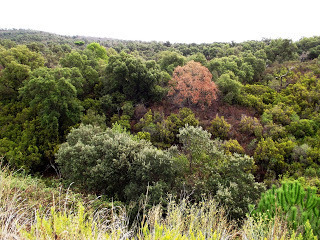 We always intend to say what we mean, but do we always actually say what we mean?
We always intend to say what we mean, but do we always actually say what we mean?‘She strode straight through the door.’ So, is ‘she’ a superhero, a ghost, or blind? She might well have walked straight through the open doorway. But it’s doubtful she ploughed through the barrier itself. A small adjustment, but one that’s vital to the correct understanding of your words.
‘Your not getting you’re wicked way with me.’ I know; you wouldn’t dream of doing this. But you’d be surprised how many times the possessive is mixed up with the contraction. And it’s easily corrected. Just spell out the contraction ‘you are’ in full and the sense becomes immediately obvious. So, perhaps, now you are getting your wicked way with me, after all. I look forward to the encounter.
‘More then anything else, this confusion drives me up the wall, than I go into a rage.’ Once again, you never do this, do you? One letter different, but such variation in meaning. ‘Then’ is an adverb, conjunction, noun and adjective we use to express an aspect of time. Examples? Adverb – ‘Carelessly, in her infatuation for Bob, she caught what was then known as a social disease.’ Conjunction – ‘He went swimming, then he put on his trunks.’ Noun – ‘That was then, this is now.’ Adjective – ‘She approached the then Prime Minister and punched him on the nose.’
‘Than’ is a conjunction and a preposition that introduces comparison. Conjunction – ‘It is better to have done that, than never to have done this at all.’ Preposition – ‘Jenny was bigger in all her proportions than was Jane.’
So, ‘then’ for time and ‘than’ for comparison. Easy isn’t it?
The picture? I like to give a little colour to my posts, and Zemanta, my usual source for these, revealed nothing relevant, so enjoy the French countryside.
Related articles
 Most of What You Think You Know About Grammar is Wrong
Most of What You Think You Know About Grammar is Wrong

Published on February 21, 2013 00:30
February 14, 2013
#One Billion Rising
 English: A campaign against female genital mutilation – a road sign near , Uganda. עברית: .מאבק נגד מילת נשים - שלט הסברה בצד הכביש, ליד קפצ'ורווה, אוגנדה (Photo credit: Wikipedia)
English: A campaign against female genital mutilation – a road sign near , Uganda. עברית: .מאבק נגד מילת נשים - שלט הסברה בצד הכביש, ליד קפצ'ורווה, אוגנדה (Photo credit: Wikipedia)I usually post about writing on Thursdays but today’s a day of action on a topic close to my heart, so please forgive my passion ruling my sense of duty on this occasion. I suspect many of you won’t have heard about a growing movement that aims to act in defence of women subject to violence. It takes many forms: the fight against it, that is. There are many, many places on the web where you can participate without a huge amount of effort.
I’ve never been a campaigner in physical protest, getting out on the street, partaking in revolution or rebellion in a physical way: such protest is too easily high-jacked by those with vested interests in promoting their own violent and often extreme political views. Such protest can frequently do more harm than good. I’m a writer. My skills lie in my ability to communicate through the written word: it’s therefore more appropriate for me to work as a spreader of the word, a reporter on the topic, an informer to the unaware.
 So, this piece and my other internet activities constitute my activity, my contribution to the debate. I hope to raise awareness of the issue and perhaps persuade more people, especially men, to become engaged in the cause against violence to women. At the end of this short piece I’ll provide links to sites of interest where you can learn more, participate, and spread the word, as you see fit.
So, this piece and my other internet activities constitute my activity, my contribution to the debate. I hope to raise awareness of the issue and perhaps persuade more people, especially men, to become engaged in the cause against violence to women. At the end of this short piece I’ll provide links to sites of interest where you can learn more, participate, and spread the word, as you see fit.Violence against women, against the female of our species of all ages, is widespread, destructive, unjust and sometimes simply casual. There are societies, political movements, religions, and criminal groups that treat women as commodities; goods and chattels to be used, abused, traded and disposed of without any regard to their humanity.
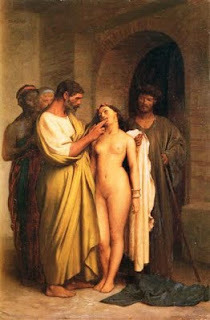 In certain parts of the world, girl babies are routinely killed because the male line is the one that inherits, and dowries are required to be paid on the marriage of a daughter. There are groups where the insanely cruel practice of female genital mutilation, euphemistically labelled ‘female circumcision’, is routinely carried out on young women approaching puberty. The rationale for this horrific abuse, often controlled by the mothers of the victims, is that a woman incapable of experiencing the real pleasures of sex is unlikely to stray from the marital bed.
In certain parts of the world, girl babies are routinely killed because the male line is the one that inherits, and dowries are required to be paid on the marriage of a daughter. There are groups where the insanely cruel practice of female genital mutilation, euphemistically labelled ‘female circumcision’, is routinely carried out on young women approaching puberty. The rationale for this horrific abuse, often controlled by the mothers of the victims, is that a woman incapable of experiencing the real pleasures of sex is unlikely to stray from the marital bed. Within the more extreme versions of Islam, there are groups that continue to stone to death a raped woman, accusing her of infidelity.
The Catholic church routinely turns a blind eye to the rape and assault of both male and female children at the hands of its priests, whilst condemning any girl subsequently found to be pregnant to suffer the torture of giving birth the bastard so conceived.
 Women are beaten daily by tribal husbands in Africa, Asia and the Middle East simply because they fail to satisfy every demand of these men.
Women are beaten daily by tribal husbands in Africa, Asia and the Middle East simply because they fail to satisfy every demand of these men. In the USA, a land that prides itself on freedom and modernity, the right wing element of the Christian church is more concerned about the rights of an unformed foetus than about those of its raped mother. I could go on, but the list is disappointingly long.
The vast majority of violence against women is perpetrated by men; though some is committed by other women, especially mothers. The greatest single cause of this violence stems from ignorance. Education, of both men and women, is a key route to the solution of the problem. As a consequence of ignorance, fear plays a huge role also: we all know that bullies are, almost without exception, cowards. A man who fears ridicule because a woman rejects him, who fears his sexual prowess will be called into doubt if ‘his’ woman appears to be enamoured of another man, who fears that a woman is actually more intelligent, rational or simply ‘right’, will lash out if he has no social example to show him that this is not acceptable or correct. And it is education that will most surely deal with such ignorance.
 Many will complain that changes in custom and tradition are needed to end some of these practices. The argument that cultural difference is an insurmountable difficulty will hold sway with many others. But these attitudes hide a reluctance to face the realities. At base, we’re all aware that the ‘golden rule’ is the only real arbiter of true justice in this world and that all deviations are the result of domination by one group of bullies over another. But we have moved on from the days when might was right. That the world is not uniformly developing a rational and reasonable consciousness does not excuse the toleration of practices that are, by any logical measure, brutal and unjust. The fact that an action stems from custom or tradition does not automatically confer legitimacy upon it. I challenge those who defend brutality on the grounds of culture to apply the golden rule to these actions and examine them in that light. The advantage of using this as a yardstick is that it (Do unto others as you would have them do to you) lies outside the rules, laws and traditions of any religion. The simple idea expressed by this rule is based on mutual respect and informed self-interest. We would do well to make it a universal law in all our dealings with each other and to outlaw all instances of ‘law’ that fail to conform with it.
Many will complain that changes in custom and tradition are needed to end some of these practices. The argument that cultural difference is an insurmountable difficulty will hold sway with many others. But these attitudes hide a reluctance to face the realities. At base, we’re all aware that the ‘golden rule’ is the only real arbiter of true justice in this world and that all deviations are the result of domination by one group of bullies over another. But we have moved on from the days when might was right. That the world is not uniformly developing a rational and reasonable consciousness does not excuse the toleration of practices that are, by any logical measure, brutal and unjust. The fact that an action stems from custom or tradition does not automatically confer legitimacy upon it. I challenge those who defend brutality on the grounds of culture to apply the golden rule to these actions and examine them in that light. The advantage of using this as a yardstick is that it (Do unto others as you would have them do to you) lies outside the rules, laws and traditions of any religion. The simple idea expressed by this rule is based on mutual respect and informed self-interest. We would do well to make it a universal law in all our dealings with each other and to outlaw all instances of ‘law’ that fail to conform with it.Finally, much violence against women is allowed simply because various cultures, religious sects and traditions have debased women. This is almost always the result of ignorance of the biological facts. Consider the old habit of rulers disposing of wives who failed to give them a male heir: we now know that the sex of a child is dependent on the input from the male. Blaming a woman is ignorant and stupid.
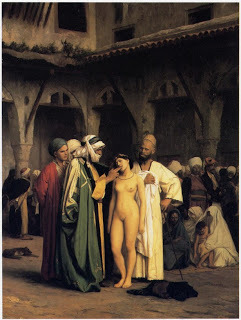 The idea of male supremacy stems largely from the brute force that most men are able to apply against women. The simple biological differences between the genders makes men, in general terms, stronger than women. Of course there are exceptions, but the general rule applies and is responsible for the irrational attitude to supremacy that continues in many cultures. We no longer live in a world where brute force is the prime factor in a group’s survival. Other factors, many of them the domain of the female of the species, now apply to the continued health of any society. Education will make this clear. Education will restore the proper respect and sense of worth for women. But, and I understand there’ll be much resistance to this idea, education must be free from the interference of any religion for it to have the necessary effect. It’s clear that much of the religious world was born out of traditional ignorance and to allow it to have undue bearing on the education of our children is to perpetuate the problems we need to solve. If parents want their children to be raised in any given faith, let them do it outside of general institutions of education.
The idea of male supremacy stems largely from the brute force that most men are able to apply against women. The simple biological differences between the genders makes men, in general terms, stronger than women. Of course there are exceptions, but the general rule applies and is responsible for the irrational attitude to supremacy that continues in many cultures. We no longer live in a world where brute force is the prime factor in a group’s survival. Other factors, many of them the domain of the female of the species, now apply to the continued health of any society. Education will make this clear. Education will restore the proper respect and sense of worth for women. But, and I understand there’ll be much resistance to this idea, education must be free from the interference of any religion for it to have the necessary effect. It’s clear that much of the religious world was born out of traditional ignorance and to allow it to have undue bearing on the education of our children is to perpetuate the problems we need to solve. If parents want their children to be raised in any given faith, let them do it outside of general institutions of education.So, to how you can work for the good of women in the world in general. The following links lead to areas you can further develop. Thank you for reading this lengthy piece. I welcome comment, as usual, of course. And if any readers have additional sources of information, please add these to your comments.
http://onebillionrising.org/pages/share-your-plans http://www.asafeworldforwomen.org/fieldpartners.htmlhttp://safeworldcommunity.net/http://www.avaaz.org/en/petition/start_a_petition/?cl=2491518899&v=21821http://www.unicef.org/index.phphttp://iwastesomuchtime.com/on/?i=65318https://www.facebook.com/7Wonderlicioushttp://unprocessedfamily.blogspot.co.uk/2012/01/i-didnt-set-out-to-have-breastfeeding.htmlhttp://www.guardian.co.uk/global-development/2012/aug/17/female-genital-mutilation-banned-somaliahttp://www.slate.com/blogs/behold/2013/01/22/mcandrews_nevada_rose_inside_the_american_brothel_photos.htmlhttp://www.youtube.com/user/TheGuardianhttp://imgfave.com/view/2518961?r=pinhttp://jenblizzard.blogspot.co.uk/2012/04/april-is-national-child-abuse.htmlhttp://www.vittana.org/
I could go on, but I don’t want to overload you. I’d rather you got involved. Thank you for your patience.
Related articles
 B.C. Sikhs to raise awareness of violence against women Feb. 14
B.C. Sikhs to raise awareness of violence against women Feb. 14
 1 Billion Rising: End to violence against women
1 Billion Rising: End to violence against women
 Gloucester Slutwalk: women are never to blame for sexual violence
Gloucester Slutwalk: women are never to blame for sexual violence
 The 22 Men Who Voted Against The Violence Against Women Act.
The 22 Men Who Voted Against The Violence Against Women Act.
 One Billion Rising movement brings unique event to London for the first time
One Billion Rising movement brings unique event to London for the first time
 One billion rising and ...
One billion rising and ...

Published on February 14, 2013 00:00
February 9, 2013
The Dark Twin, by Marion Campbell, Reviewed.
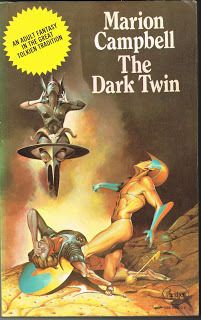 Hailed, on the front cover, as ‘An adult fantasy in the great Tolkien tradition’, this novel disappointed on a number of levels. So much so, that I couldn’t be bothered to get past page 67 of 249 pages. It was clearly much applauded at the time of publication in the 1970s; described variously as ‘beautiful’, ‘fascinating’ and ‘a harsh elemental poetry’, by reviewers in the major newspapers. Either they read a different book, or I failed to find the elements they drew from the pages.
Hailed, on the front cover, as ‘An adult fantasy in the great Tolkien tradition’, this novel disappointed on a number of levels. So much so, that I couldn’t be bothered to get past page 67 of 249 pages. It was clearly much applauded at the time of publication in the 1970s; described variously as ‘beautiful’, ‘fascinating’ and ‘a harsh elemental poetry’, by reviewers in the major newspapers. Either they read a different book, or I failed to find the elements they drew from the pages.The language is ‘beautiful’ and there are undoubtedly ‘fascinating’ elements in the tale and some of the events are harsh and poetically presented. But the parts do not seem to add up to a ‘whole’. In fact, I found the narrative tedious, the attempt to weave a mystery out of the incomprehensible lacking in enough intrigue to make me want to read on. Fantasy, of this type, is traditionally a depiction of life in an invented or imagined landscape and is generally built on ancient and well understood themes. Tolkien, with whom this author was compared, dealt quite obviously with the battle between good and evil and set his tale in a land similar to our own Earth, peopled by humans, hobbits, elves and dwarves along with all those mystical and fabulous creatures he borrowed from the myths of Northern Europe. But I was at a loss to understand where this tale was leading and what themes drove it. Had there been some indication that I was, at least, being taken somewhere of interest, I would probably have stayed with it. But I felt I was in an endless exposition describing the arcane customs and rites of some civilisation I found difficult to comprehend and that I was being led into a maze with little hope of discovering the whys and wherefores before being abandoned without any solution.
The nature of the story, such as it is, told in the form of a narrative, initially with dialogue only sparsely used to relieve the monotony of the first person narrator’s description of his life of harsh instruction, quickly began to bore me. I didn’t need endless hints about the corruption, bullying and deception of the ruling individuals; so much was clear. I would have liked a little more indication of the motivations that drove the protagonists, beyond the evident ambition of the priesthood. I would have liked a spark of rebellion or, at least, questioning, from the two young boys who were being raised for positions of rule; something to make them interesting. The ‘gift’ of foretelling and farseeing seemed small reward for the level of deprivation visited on the victims.
In short, I was waiting for something to ‘happen’. I think the main problem with the narrative was that I was ‘told’ so much and ‘shown’ so little, that I felt ever the observer, the voyeur, and never a participant, never even an involved bystander. Only the singer, Felim, brought any contrast to the otherwise unmitigated misery of the tale. A touch of lightness, some hope, an indication of something better to come, might have kept me turning the pages. But, in the end, I felt unwilling to spend any more of my precious time on this depressing story that seemed to be going nowhere.
No doubt fans of the author, of which there may well be many, will castigate me for a fool and a dullard for failing to recognise the magic they have found. But I can judge only on my own terms and, as a reading experience, I found this disappointing, dull and lifeless. Sorry, but there you are.
Related articles
 Was Tolkien right about fantasy?
Was Tolkien right about fantasy?
 Tolkien and Dangerous Fairies
Tolkien and Dangerous Fairies

Published on February 09, 2013 12:39
February 7, 2013
What’s Your Greatest Weakness, as a Writer, and Why?
 "Study drawing shows the allegorical figure of Romance nude. She bends her head to read a book on her lap. Romance was one figure in a painting, The arts, in the north end lunette of the Southwest Gallery in the Library of Congress' Jefferson Building." Graphite drawing (Photo credit: Wikipedia)
"Study drawing shows the allegorical figure of Romance nude. She bends her head to read a book on her lap. Romance was one figure in a painting, The arts, in the north end lunette of the Southwest Gallery in the Library of Congress' Jefferson Building." Graphite drawing (Photo credit: Wikipedia)And, How Are You Overcoming It?
Last week, I looked at strengths. This time, I want to take a gander at weaknesses. We all have them. I know what my major weakness is, one of many, but this one is the most important: I spread myself too thinly.
What do I mean?
I do this in many ways:1. I divide my time between many activities instead of concentrating on what's most important.2. I can't settle on any given genre, spreading my ideas into many different types of writing so that I find it difficult to label myself as a practitioner in any one field.3. I support too many different campaigns, giving my voice and action to a multitude of worthy causes.4. I read many differing titles, failing to concentrate on a specific topic or genre.
Okay, I hear many of you choosing one or more of these instances and arguing that these are not necessarily bad things. And, I agree. Variety is essential to anyone who creates. A wide-ranging interest is vital to the development of knowledge and intellect. Compassion is a response given by a caring heart and restricting it may seem selfish. Ideas can either be adapted and crammed, made to fit a specific genre of writing, or they can be given the freedom to express themselves in whatever form seems most appropriate for the story.
Let's deal first with those things that are outside the narrower field of writing, those things that fall within the normal life choices of us all, regardless of what we do for a living.
The causes are always a personal matter. I feel as if I get involved with many, but, in reality, I tend to concentrate on 4 main areas. (a)The environment and those things that impact on the future of the planet. (b) Poverty and it's destructive effect on those under its heel. (c) Religion and its negative input to society in general. (d) Education for all, especially women. Of course, these interests tend to spread and merge with others and bleed off into associated topics. And, yes, I do find myself sometimes pulled into a fight for farm animals, wild animals, even pets. It would be possible for me to spend my entire waking life fighting for causes in one way or another. But I feel I wouldn't be doing the best possible with the few talents I possess, so I have to consciously curtail and restrict those activities. They do, nevertheless, consume large amounts of my time and energy. Will I stop? Of course not. It's who I am and I'm willing to put up with that for the sake of those things I care about. Could I do more? Of course. Will I? Probably not, simply because I have a limited amount of time and energy at my disposal and there are other aspects of life I wish to become involved with.
Reading is another personal choice. The experts and pundits would have us believe that we, as writers, must read all we can of the contemporary genre(s) in which we write. I have some sympathy with the point of view. But I'm interested in many different things and my reading time is as limited as all other aspects of modern life. Let's have a 72 hour day and the need for no sleep and I might get close to reading some of what I'd like to sample. But the reality is that we are, again, limited by time and energy and therefore must select those books that we feel are most likely to entertain, inform, educate and inspire us. I currently have a 'to read' list over 130 titles in length, all sitting on my shelves. I had made a decision to read them all before I bought, borrowed or accepted as gifts, any new books. But, in writing this piece, I find myself subject to a small epiphany. I shall go through that list and extract all those titles that I was going to read in reality because they 'ought to be read'. They can go back on the shelves, to be read at leisure once I no longer have the urge to write. So, they can accompany me in my coffin and I'll read them by the light of slow putrefaction. I'll read those that I actually want to read and the rest can wait. I'm curious to see how that will reduce the list. See, this exercise has already produced positive results, for me at least.
Finally, my inability to settle on a specific genre. Will I tailor my future writing to, say, thrillers, or perhaps that most popular genre, romance? Maybe I'll concentrate on science fiction, or its brother, fantasy. Should I dive into the dark world of horror? Maybe I could dig up some crime. A bit of mystery? History calls from afar. A bit of sex in the form or erotica might spice things up a little.
But, actually, I'm not the sort of writer who can even begin a story with an idea of genre. When an idea takes me, I start to write and the genre emerges from the tale as I tell it. I am, at heart, a story teller. I love character and those threads of event that characters cause during interaction. I cannot envisage sitting down and writing out a plot. Oh, believe me, I've tried. Plot is a device, an artificial construct on which a story may be built. It's suitable for many types of stories. But not for the stories I develop. I write organically, I write by the seat of my pants. A plot would simply get in the way and, in any case, I'd deviate from it as soon as the first character decided he or she didn't want to go in that direction. So, I guess I'm stuck with being a multi-genre writer. I accept that means I'll never be known in any given field; I'm unlikely to be considered a commercial prospect by any publisher. I understand that my chances of making a million with my writing are significantly reduced (as if that chance ever really existed anyway. Even if it did, it was never a motivator for me). But I write because I must and I write because I love it and I write because I have things to say. If I don't do that in my own way, with my own voice, what's the point?
So, those are my confessions, which, they say, are good for the soul. This has been a useful exercise for me. It might help you; it depends on the sort of writer you are and what motivates you, I suppose. Why not share your thoughts in the comments? I love to know what others think.
Related articles
 A Writer of Many Genres: Guest Post by Vicki Taylor
A Writer of Many Genres: Guest Post by Vicki Taylor
 What constitutues "Plot" in fiction? GENRE's a big factor
What constitutues "Plot" in fiction? GENRE's a big factor
 Read to Write
Read to Write
 Author Sean Platt Says He Didn't Shun Cliches in New Release of Available Darkness 2 - And Other Authors Shouldn't Either
Author Sean Platt Says He Didn't Shun Cliches in New Release of Available Darkness 2 - And Other Authors Shouldn't Either

Published on February 07, 2013 01:30
February 6, 2013
Life of Pi, by Yann Martel, Reviewed.
 A fantasy novel written in the style of a documentary narrative: that does the book a great injustice. Although the germ came from an earlier work about a man at sea with a leopard, this book is a work of great and unique imagination. The clever attempts to make the reader believe this is a true story lend the tale a veracity that would be diminished had it been written simply as a conventional novel.
A fantasy novel written in the style of a documentary narrative: that does the book a great injustice. Although the germ came from an earlier work about a man at sea with a leopard, this book is a work of great and unique imagination. The clever attempts to make the reader believe this is a true story lend the tale a veracity that would be diminished had it been written simply as a conventional novel.Much that happens is, of course, incredible. The comment that the book will make even an atheist believe in God, along with the stated distrust of agnostics, struck a chord with me, since I am that agnostic, and proudly so. And, for the record, whether intended or not, it certainly didn’t convince me that there is a god.The plight of the protagonist, the description of his early life in India with his eccentric parents and odd upbringing, lead the reader to empathise in surprising ways. The courage and inventiveness of the young man, his tenacity, his honesty and his duplicity make for internal contrasts that enliven the whole tale. It becomes difficult to determine what is ‘true’, what is the product of his imagination as he attempts to remain both sane and alive in a perilous situation, what is illusion or mirage, and what is sheer invention on his behalf.
There’s humour here, inspiration, some subtle education and a great deal of entertainment on many levels. The author has gone to considerable lengths to understand the difficulties a boy in a lifeboat in the Pacific might face. He’s researched his biology and botany well, and gives a good account of the nature of the tiger and the other animals that feature. He makes an impassioned plea for the support of zoos and drives a wonderful stake through the heart of divisions that make religions enemies of each other and of some of those who have no faith.
The story is engaging, fascinating, moving, terrifying, bizarre and extraordinary. If you like your fiction to surprise and delight, to undermine and provoke, then you will enjoy this novel. I did, and I thoroughly recommend it.
Related articles
 Life of Pi by Yann Martel - review
Life of Pi by Yann Martel - review
 Life of Pi Yann Martel
Life of Pi Yann Martel
 Life of Pi by Yann Martel
Life of Pi by Yann Martel
 Yann Martel On The Illustrated Version Of Life Of Pi
Yann Martel On The Illustrated Version Of Life Of Pi
 "Life of Pi" Author Reveals to PBS.org That The Inspiration For His Best-Selling Book And Now Hit Film Came From A Little Known Book About A Shipwrecked German Boy
"Life of Pi" Author Reveals to PBS.org That The Inspiration For His Best-Selling Book And Now Hit Film Came From A Little Known Book About A Shipwrecked German Boy

Published on February 06, 2013 12:12
February 5, 2013
So, Where's the Pie Chart?
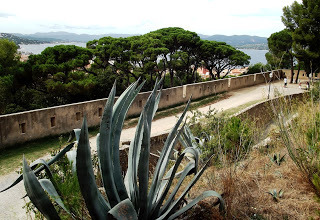 Okay, so I've been detailing my progress through the year each Tuesday, giving a weekly report on what I've achieved and why, or why not, depending on circumstances. So, where is it this week?
Okay, so I've been detailing my progress through the year each Tuesday, giving a weekly report on what I've achieved and why, or why not, depending on circumstances. So, where is it this week?Well, it's time consuming. And I suspect it can be done every bit as well on a monthly basis. So that's what I'll do for the rest of the year. End of the month (or thereabouts, depending on my activity at the time) I'll produce an analysis. It acts as a motivator for me and gives visitors an idea of how time can be spent, wasted or used.
The picture? I like to give a visual spark to my posts, so here's a landscape to inspire you as a setting for a story. If you click on it, it'll appear at a larger size.
Related articles
 The pie of your life!
The pie of your life!

Published on February 05, 2013 00:20



